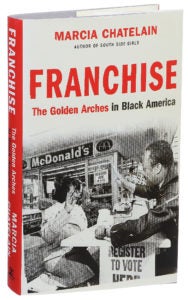Golden Arches: New Book Explores McDonald’s, Civil Rights and Politics
How fast-food franchises like McDonald’s became one of the greatest generators of black wealth in America is the subject of a new book by history professor Marcia Chatelain.

Franchise: The Golden Arches in Black American, 2020
Franchise: The Golden Arches in Black America (W.W. Norton & Company, 2020) explores the rich history at the intersection of fast food, civil rights, health and politics while examining both the positive and negative effects of the fast-food industry on communities of color.
Chatelain, who also wrote South Side Girls: Growing Up in the Great Migration (Duke University Press, 2015), received a National Endowment for the Arts grant to work on Franchise.
“This book was a real labor of love for me because it allowed me to join my many interests – African American history, food studies and writing the stories of poor people contending with constrained or limited choices,” Chatelain says.
The professor provides additional narratives for an industry often cited solely as a contributor to the rising rates of obesity and diabetes among black Americans.
Fast Food, Long History
The book outlines how large chains such as McDonald’s shifted in the 1960s to urban areas and recruited African Americans to own franchises after white people abandoned theirs following the riots that took place after the assassination of Martin Luther King Jr.
The professor draws on first-hand accounts of those who lived through the shift, as well as on documents revealing the government’s involvement in the fast-food industry.
By the late 1980s, Chatelain notes, these franchise owners provided job opportunities for African American youth as part of a corporate affirmative action program and underwrote black cultural activities.
“Ultimately, I hope my book helps everyone be more compassionate toward people and individuals who are judged harshly for eating fast food and to turn their attention toward the structural failures that have allowed fast food to have such a huge impact on people’s lives,” Chatelain says.
Fueling Self-Determination
She got the idea for the book while doing archival research in Chicago for South Side Girls.
Chatelain began noticing plaques around the city that mentioned the National Black McDonald’s Operators Association as a sponsor and realized that the quiz bowl she participated in high school and other cultural and educational events had been sponsored by the association.
That began a deeper dive into looking at how the communities “fueled their self-determination and their institution-building through the mechanism of fast food.”
Glowing Reviews
Franchise has already received several glowing reviews.
“Throughout this impressively judicious book, she is attuned to the circumstances that encouraged increasingly intricate ties between McDonald’s and black communities across the country,” Jennifer Szalai wrote in a Jan. 8 New York Times review. “This isn’t just a story of exploitation or, conversely, empowerment; it’s a cautionary tale about relying on the private sector to provide what the public needs, and how promises of real economic development invariably come up short.”
Kirkus Review wrote that “Chatelain’s impressive research and her insertion of editorial commentary will prove educational and enlightening for readers of all backgrounds.”
About Chatelain
In addition to her two books, Chatelain has contributed to TheAtlantic.com, Time.com, and Ms. Magazine. She has also written for The Chronicle of Higher Education, which named her a “Top Influencer in Higher Education” in 2016.
Chatelain also served on Georgetown’s Working Group on Slavery, Memory, and Reconciliation, and has appeared on local and national television outlets including C-Span, MSNBC, CNN, BBC America and PBS.
She appeared in the 2019 Stanley Nelson documentary, Boss: The Black Experience in Business.
A Provost Distinguished Professor at Georgetown, Chatelain was recently named an Andrew Carnegie Fellow and has been awarded an Eric and Wendy Schmidt Fellow at the New America Foundation.
She plans to use her Carnegie fellowship to research her next book, The Scholarship Kid: A Social History of Higher Education and Inequality in America.
